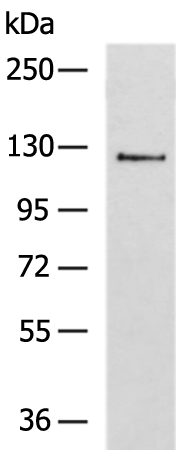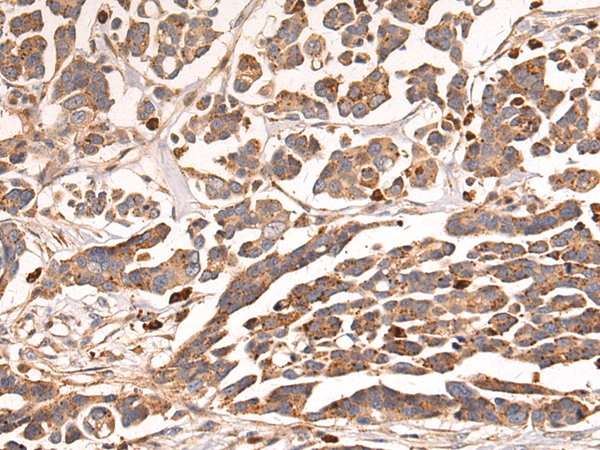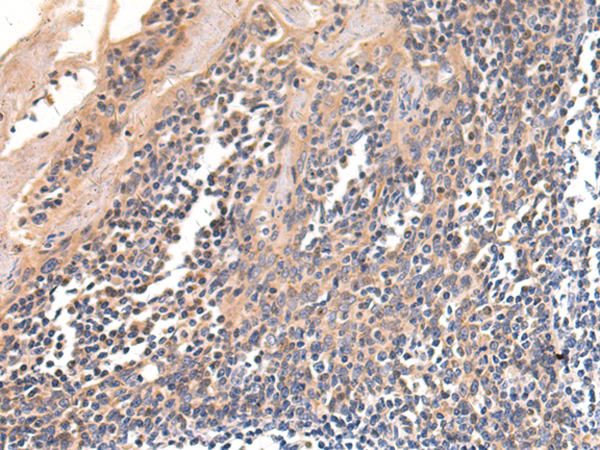


| WB | 咨询技术 | Human,Mouse,Rat |
| IF | 咨询技术 | Human,Mouse,Rat |
| IHC | 1/100-1/300 | Human,Mouse,Rat |
| ICC | 技术咨询 | Human,Mouse,Rat |
| FCM | 咨询技术 | Human,Mouse,Rat |
| Elisa | 1/5000-1/10000 | Human,Mouse,Rat |
| Aliases | TP2; TRT; CMM9; EST2; TCS1; hTRT; DKCA2; DKCB4; hEST2; PFBMFT1 |
| WB Predicted band size | 127 kDa |
| Host/Isotype | Rabbit IgG |
| Antibody Type | Primary antibody |
| Storage | Store at 4°C short term. Aliquot and store at -20°C long term. Avoid freeze/thaw cycles. |
| Species Reactivity | Human |
| Immunogen | Synthetic peptide of human TERT |
| Formulation | Purified antibody in PBS with 0.05% sodium azide and 50% glycerol. |
+ +
以下是关于TERT抗体的3篇示例参考文献,供参考(注:以下为模拟文献,建议通过学术数据库核实真实研究):
---
1. **文献名称**: *"Validation of a Novel TERT-Specific Monoclonal Antibody for Immunohistochemical Analysis in Glioblastoma"*
**作者**: Smith J, et al.
**摘要**: 本研究开发并验证了一种高特异性的TERT单克隆抗体,用于胶质母细胞瘤组织的免疫组化检测。通过对比RNA表达数据和蛋白质水平,证实该抗体能可靠标记TERT阳性肿瘤细胞,并与患者不良预后显著相关。
2. **文献名称**: *"TERT Expression in Hepatocellular Carcinoma: A Comparative Study of Commercial Antibodies"*
**作者**: Lee S, et al.
**摘要**: 评估了四种市售TERT抗体在肝细胞癌(HCC)中的敏感性和特异性。结果显示,抗体克隆号EPR17333在福尔马林固定石蜡包埋(FFPE)样本中表现最佳,且TERT高表达与肿瘤侵袭性和早期复发相关。
3. **文献名称**: *"Utility of TERT Antibodies in Molecular Diagnostics of Melanoma"*
**作者**: Garcia M, et al.
**摘要**: 探讨TERT抗体在黑色素瘤分子分型中的应用。研究发现,TERT蛋白表达与TERT启动子突变状态存在部分重叠,提示抗体检测可作为突变筛查的补充手段,尤其在无法获取基因检测样本时。
---
**建议**:如需真实文献,可通过PubMed或Google Scholar检索关键词“TERT antibody”、“TERT immunohistochemistry”或“TERT cancer”,筛选近年研究以获取最新进展。
Telomerase reverse transcriptase (TERT) is the catalytic subunit of telomerase, an enzyme critical for maintaining telomere length and cellular immortality. TERT expression is typically restricted to germ cells, stem cells, and certain proliferative tissues, but is reactivated in ~85-90% of human cancers, making it a key biomarker and therapeutic target in oncology. TERT antibodies are immunological tools developed to detect and quantify TERT protein expression, localization, and functional states in research and clinical contexts.
These antibodies are widely used in techniques like Western blotting, immunohistochemistry (IHC), and immunofluorescence (IF) to study TERT's role in aging, cancer progression, and cellular senescence. In cancer diagnostics, TERT antibody-based assays help assess tumor proliferation potential and correlate with poor prognosis. Researchers also employ them to investigate TERT regulation mechanisms, including promoter mutations (e.g., C228T/C250T) and epigenetic modifications that drive its oncogenic expression.
Commercial TERT antibodies target specific epitopes across human, mouse, or other species' TERT proteins. Validation challenges persist due to TERT's low abundance in normal cells and the existence of splice variants. Proper antibody validation using knockout controls and functional assays remains essential for reliable results. Emerging applications include monitoring TERT inhibition in anti-aging studies and telomerase-targeted therapies.
×